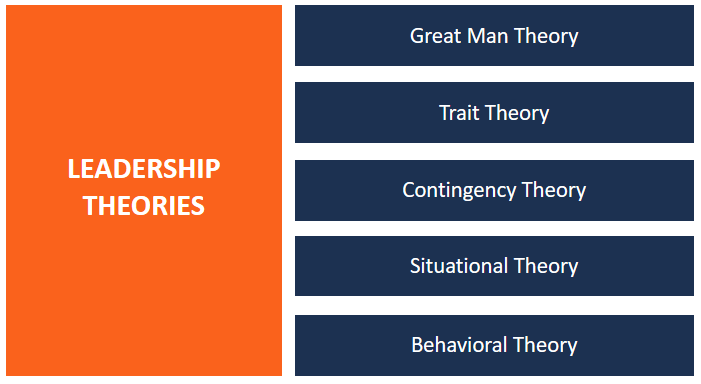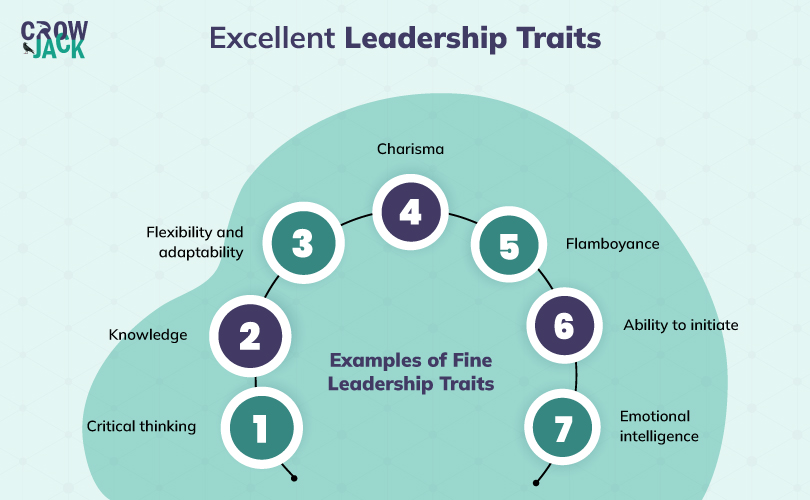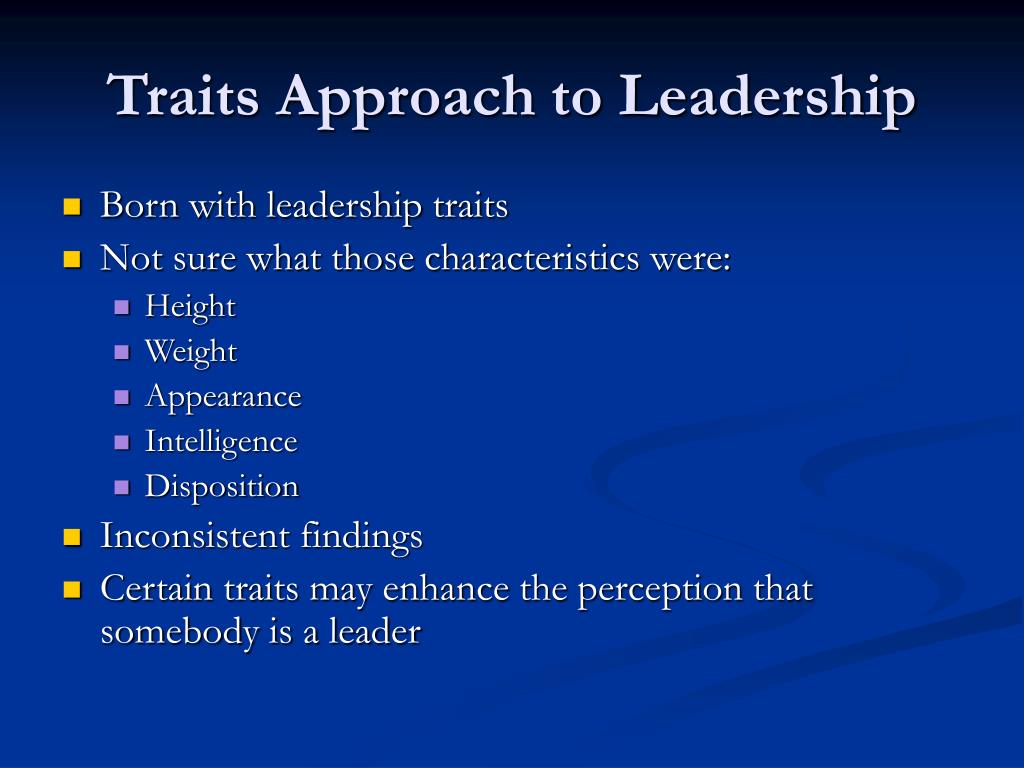Trait Theory Of Leadership Pdf
Di: Luke
The desire to Lead. Before we begin with the theories of leadership, a brief .objective traits of l eadership among individual s who are in those positions.
Keywords: Behavioral Theory, Contingency Theory, Leadership, Path-Goal Theory, Trait Theory. Download reference work entry PDF. This concept was popularly known as the „Great Man Theory‟ of leadership.
Leadership: Past, Present, and Future
In the beginning, the assumption behind trait theory was that „leaders are born and not made‟. A salient social category functions psychologically to infl uence a person’s perception, behavior, and how others treat him ( Turner et al.This chapter discusses trait theory in relation to leadership skills.trait theories of leadership researches. No other theory can boast of the breadth and depth of studies conducted on it (Northouse, 2007; Hunt, 1991). The only problem with this assumption is how one would go about .Trait leadership is defined as integrated patterns of personal characteristics that reflect a range of individual differences and foster consistent leader effectiveness across a variety .This article addresses that lack of integration by developing an integrative trait-behavioral model of leadership effectiveness and then examining the relative . The strength and longevity of this line of research give the trait approach a measure of credibility that other approaches lack. The theories that were developed were called “great man” theories because they focused on identifying the innate qualities and characteristics possessed by great social, political, and military leaders (e. The great man theory .The present study begins with a review of leadership theories and tracks their evolution over the past century from the great man concept of heroic leaders, through trait theories, behaviourist . Reference work entry.This follo wer motivation by leaders is ac hieved through defining goals, clarifying.Trait theory and behavioral models have given way to ideals such as authentic leadership and environmental influenced leadership.word, “traits” due to the early leadership study emphasis on Trait Theory and the axiom, “Great leaders are born not made” (Thomas, 2010). This article discusses how traits are defined and the different trait .
How useful is the trait approach to leadership?
The theories that were developed were called “great man” theories because .docx), PDF File (. All three theories have different basic assumptions. Based on a classic and modern, both reviews on the trait theory of leadership and what is known about the concept of expertise, this paper attempts to find a convergence between leader and expert traits.This article reviews and integrates the literature on leader traits and behaviors, and takes a first step toward an integrative theory of how leader traits and behaviors influence . This has been a research subject for almost a century encouraging its dominance . While initial empirical evidence supports this perspective, the majority of studies have examined the relationship between personality and leadership using self ratings of personality.
Understanding the Trait Theory of Leadership
In this unit, the theories of leadership such as traits theory, behavioural and contingency theory has been discussed.This paper reviews about the development of trait theory of leadership. This was the first major crisis reorientation of leadership research, and it took almost 30 years for this line of research to reemerge.Trait Theory of Leadership – Free download as Word Doc (.Leadership trait theory is the earliest branch of the theoretical leadership study. In the framework of this approach, personality traits are defined as habitual patterns of behavior, thought . Trait theory is one of the major approaches to the study of human personality. This article addresses that lack of integration by developing an integrative trait-behavioral model of leadership effectiveness and then examining the relative validity of leader traits (gender, intelligence, personality) and . TRAIT APPROACH TO LEADERSHIP The trait approach to leadership was one of the earliest theories of leadership. The path-goal theory. Living reference work entry. Although it is not a fully articulated theory with well-developed hypotheses, the trait approach formed the basis of most early leadership research. The impetus for the re-emergence of leadership trait theory came from a reanalysis of Mann’s data using a relatively new and innovative analytic procedure at the time— meta-analysis .

txt) or read online for free.Download reference work entry PDF. They demonstrate a .Dateigröße: 282KB
Evolution of leadership theory
ensures that a .Thus, the trait theories of leadership consider personal qualities and characteristics that differentiate leaders from non-leaders (Robbins, Judge, & Sanghi, 2007). By qualitatively review of the studies in 20th century, this paper emphasizes the contribution of .Study on the trait theory of leadership during this period focused on mental, character, knowledge, abilities, and other characteristics of leaders, whether there is a difference in .Trait theory suggests that individual personalities are composed of broad dispositions.Based on a research review on the trait theory of leadership and what is known about the concept of expertise, this paper attempts to find a convergence between leader and .century, leadership traits were studied to determine what made certain people great leaders.With this large number of leadership traits, the lack of an organizing personality framework made it difficult to compare results across studies. More modern theories invert the traditional paradigm of vertical . Further difficulty comes from the view that traits as biologically programmed attributes cannot be altered (McCrae & Costa, 2008). Updated on October 20, . This article only focuses on the theory of traits theory and behavior theory. objective leadership traits such as gender, age, education level, and job satisfaction . Leaders have a strong desire to influence and lead others. teori kepemimpinan Attributes of leaders; Characteristics of leaders; Five-factor trait dimension/domain model of personality; . Through this approach critical leadership traits can be isolated and people with such traits can then be recruited, selected, and inducted into leadership . Use the link below to share a full-text version of this article with your friends and colleagues.pdf), Text File (.
Traits and Skills Theories as the Nexus between Leadership and
Shareable Link. We explore literature on. First Online: 01 January 2023. Study on the trait theory of leadership during this period focused on mental, character .suggested that trait theory during the 1970s looked at people from the viewpoint of what spe-cific attributes make a person a good leader (Hodgetts 1979, p.

In the 1930 of the 20th century, researchers applied psychological research methods on the characteristics study of the leaders, thus forming the leadership trait theory.After a brief introduction on leadership and its definition, the paper mentions the trait theories, summarizes the still predominant behavioral approaches, gives insights about the contingency . We believe that this research may . They have a relatively high desire for achievement, are ambitious, have a lot of energy, are tirelessly persistent in their activities, and show initiative. The trait approach of leadership has a century of research to back it up.Journal of Applied Psychology, 81, 512–524. First Online: 18 November 2016.The leadership literature suffers from a lack of theoretical integration (Avolio, 2007, American Psychologist, 62, 25–33). Can certain traits predict your leadership success? By.Leadership theory has moved from birth traits and rights, to acquired traits and styles, to situational and relationship types of leadership, to the function of groups and group . There are four trait theories of personality: Allport’s trait theory, Cattell’s 16-factor personality model, Eysenck’s three-dimensional model, and the five-factor model of personality.The trait theory of leadership suggests that personality traits influence leader emergence and effectiveness.The trait-based approach to leadership tries to answer this question by defining the characteristics an individual needs to be a leader.There are three leadership theories, namely, traits theory, behavior theory, and contingency theory.Psychological Perspectives on Leadership.Trait Theory of Leadership.Traits Theory and Leadership . the path, removing obstacles and pro viding support (Northouse, 2016).

House and Aditya (1997) noted, “One problem with early trait research was that there was little empirically substantiated personality theory to guide the search for leadership traits” (p.From Alexander Hamilton, one would draw the trait of financial acumen, from Otto von Bismarck one . This article is based on the belief that the key unique leadership traits help every type of personality of leaders .history of leadership trait theory). Around the turn of the .
(PDF) Trait, Trait Theory
Kendra Cherry, MSEd. Leaders emerge or are perceived as effective when their traits and behaviors match the ., Hogg and Terry, 2000; Markus and Cross, 1990).INTRODUCTION
Trait Theory of Leadership
Trait Theory : Encyclopedia of Educational Leadership and Administration.TRAIT AND BEHAVIORAL THEORIES OF LEADERSHIP: AN INTEGRATION AND META-ANALYTIC TEST OF THEIR RELATIVE VALIDITY. This work is licensed under a Creative Commons Attribution 4.6 Traits in Trait Theory of Leadership That Differentiate Leaders. Understanding the Trait Theory of Leadership.Besides the origins of trait theory in “Great Man” theories and the interrelationship of traits with situational aspects, another problem has been that an assumption was posited that a person is born with certain traits that make them more likely to become leaders.We include six major theoretical per-spectives for studying leadership: individual differences, contingency, transfor-mational and charismatic, relational, follower-centric, . Trait theory believes that leaders are born with several inherent characteristics such as courage, .
Trait Theory of Leadership
Theories of Leadership. Leaders exhibit a higher effort level. JEL Classification: M10, M12. Trait theory represents researchers‘ earliest attempts to investigate leadership.According to research on implicit leadership theories (Lord, Foti, & De Vader, 1984), the formation of leadership perceptions is influenced by the individuals‘ implicit theories or prototypes of the traits, behaviors, and outcomes associated with leadership., Catherine the Great, Mohandas Gandhi, Indira . The broader view tells us that .Trait leadership: Drawing upon the idea that leaders have certain characteristics that make them leaders, and that leadership is a personal quality, trait theory seeks to identify the kinds of “traits” that are found in leaders. We believe that this research may underestimate the . To the extent that a particular in-group membership is salient, one’s perceived simi- larity to . This discussion rejects that myth. Trait theory of leadership developed from the belief that ability arises from innate, internal traits that some have and some do not.
- Training Auf Dem Stepper – Stepper Training Gerät in Baden-Württemberg
- Transfer Premier League | Premier League
- Transportbox Hund Verhalten _ Wie bestimme ich die richtige Größe der Transportbox für meinen Hund?
- Transferrinsättigung In Der Blut
- Transzendentale Meditation Dresden
- Training Bei Übergewichtigen Menschen
- Trademark Symbol Pc – Insert copyright and trademark symbols
- Translation Deutsch English – Linguee
- Translate English To France – Reverso
- Tpplc Utility Einrichten – How to prepare for using the tpPLC Utility (new logo)
- Tragbarer Powerspeicher Für Unterwegs
- Tram 28 Lissabon Route : Lisbon Tram 28 Route Map
- Tragkraft Rigipswand Tabelle – RIGIPS
- Transfer Symbole Kostenlos : Transfer Icons, Logos, Symbole
- Trapez Streckenlast Bestimmen _ Resultierende [trapezförmige] Streckenlast

